- HR:+91-879-9184-787
- Sales:+91-908-163-7774
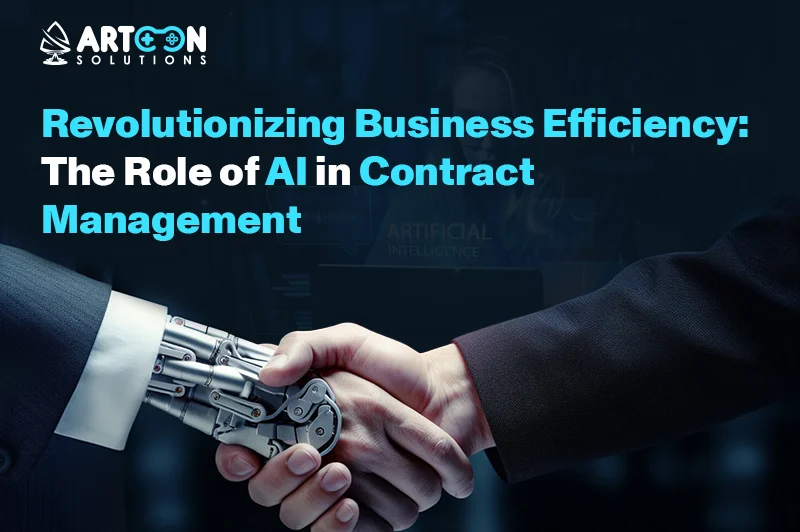
In today’s fast-paced business environment, efficiency and accuracy are essential for staying ahead of the competition. One area where AI in contract management is proving to be a game-changer is in the legal and contractual workflows. Traditionally, managing contracts has been a complex, manual, and time-consuming process, often prone to errors and delays. However, the integration of artificial intelligence into contract management is transforming this landscape, offering businesses a more streamlined, efficient, and reliable way to handle contracts.
This article will explore how AI in contract management is revolutionizing business efficiency, the key benefits it offers, the technologies driving it, and how businesses can leverage AI contract management software to gain a competitive edge. If you’re looking to implement AI-driven contract management solutions, hire AI developers to help customize and integrate the right software for your business needs.
AI in contract management refers to the application of artificial intelligence (AI) technologies such as machine learning (ML), natural language processing (NLP), and data analytics to enhance and streamline the entire process of managing contracts. Traditional contract management processes, which are typically manual, time-consuming, and error-prone, are significantly improved with the integration of AI. By automating and optimizing tasks, AI helps businesses save time, reduce risks, and enhance overall contract efficiency.
The role of AI in contract management is not just about automation but also about improving decision-making, providing valuable insights, and ensuring better compliance with contract terms. This enables businesses to operate more efficiently and with greater precision, especially when dealing with large volumes of contracts.
AI in contract management works by analyzing, interpreting, and processing contract data in ways that would be impractical or inefficient for humans. It utilizes sophisticated AI techniques to automate repetitive tasks and provide actionable insights throughout the contract lifecycle.
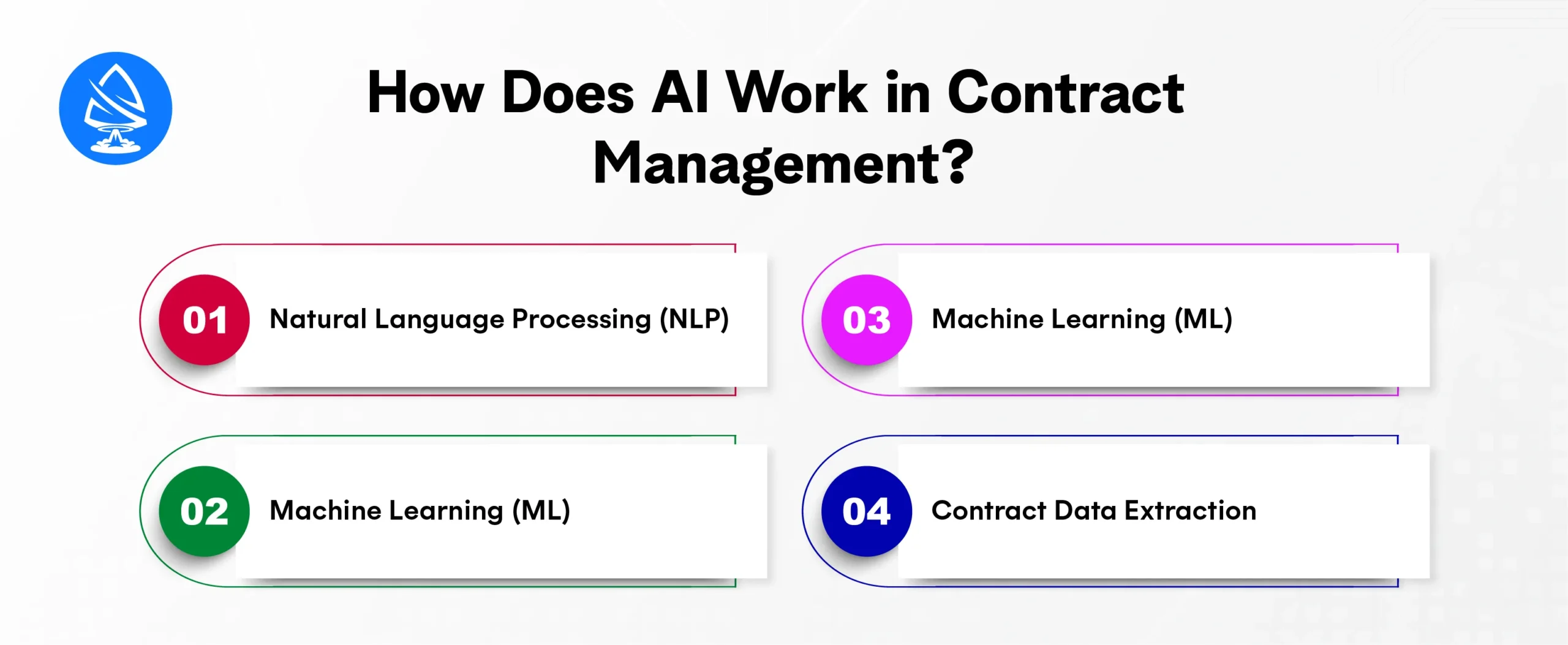
One of the key components of AI in contract management is Natural Language Processing (NLP). NLP allows AI to read, understand, and interact with human language. In the context of contract management, NLP algorithms can analyze legal text, recognize clauses, and understand their meaning within the contract.
Machine learning allows AI systems to improve over time by learning from data. In contract management, ML algorithms can analyze past contracts to identify patterns and trends that can help automate decision-making processes.
AI-driven automation in contract management includes the ability to handle repetitive tasks that usually require human intervention. These include tasks such as contract creation, review, approval workflows, and renewal tracking.
AI tools can extract data from contracts with speed and accuracy, transforming unstructured contract data into structured, actionable insights. This is crucial for large-scale contract management, where contracts may contain thousands of pages of text.
AI’s role in contract management is more than just automating repetitive tasks. Here are the key reasons why AI is becoming indispensable in this field:
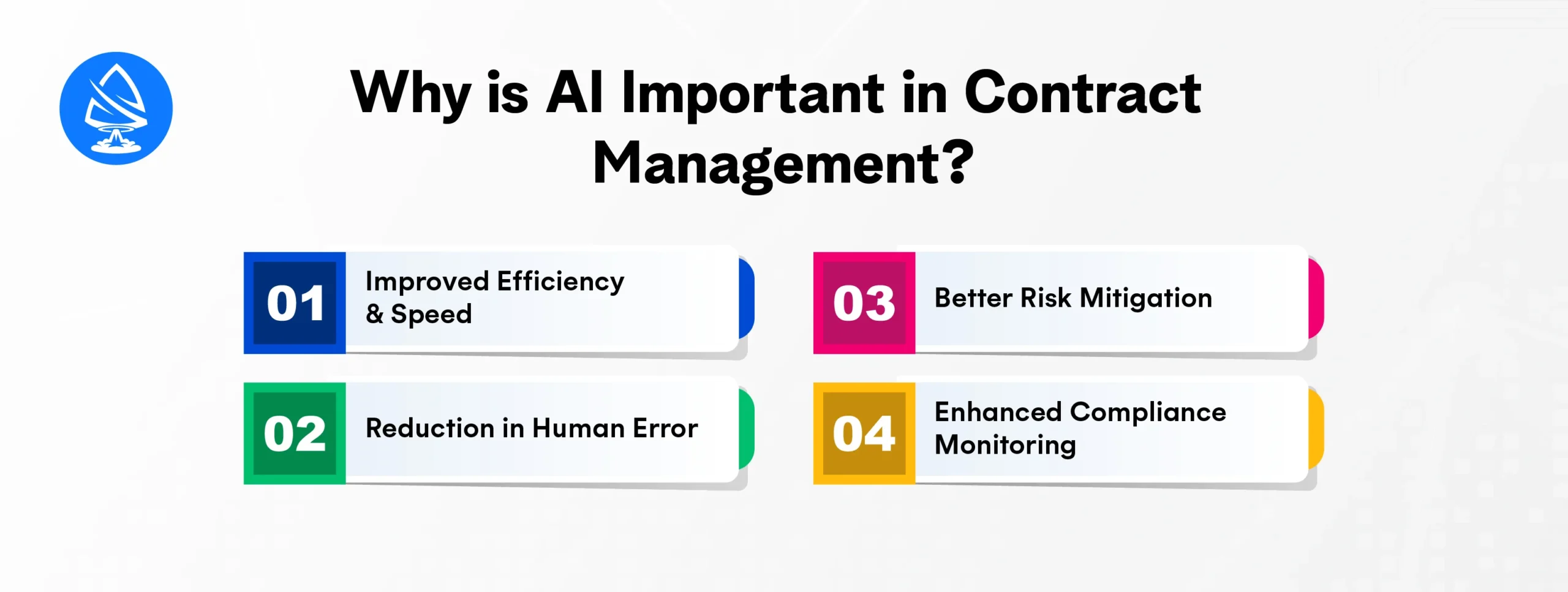
By automating routine tasks such as contract creation, review, and data extraction, AI dramatically speeds up the contract lifecycle. Legal and procurement teams no longer need to spend days or weeks manually reviewing contracts, freeing up time for higher-value tasks like negotiation and strategy.
One of the key advantages of AI in contract management is its ability to reduce the risk of human error. Since AI systems are designed to follow predefined rules and learn from past data, they are less prone to mistakes when reviewing complex contracts.
AI systems help businesses identify risks in contracts early by analyzing the terms and clauses that might result in unfavorable outcomes. This allows businesses to address these risks proactively rather than reactively.
In today’s complex legal landscape, compliance with regulatory and contractual obligations is more critical than ever. AI helps ensure that companies remain compliant with the terms outlined in their contracts and the relevant laws.
AI is transforming contract management across industries by improving contract lifecycle management, reducing errors, and enhancing decision-making. Here are some real-world applications:
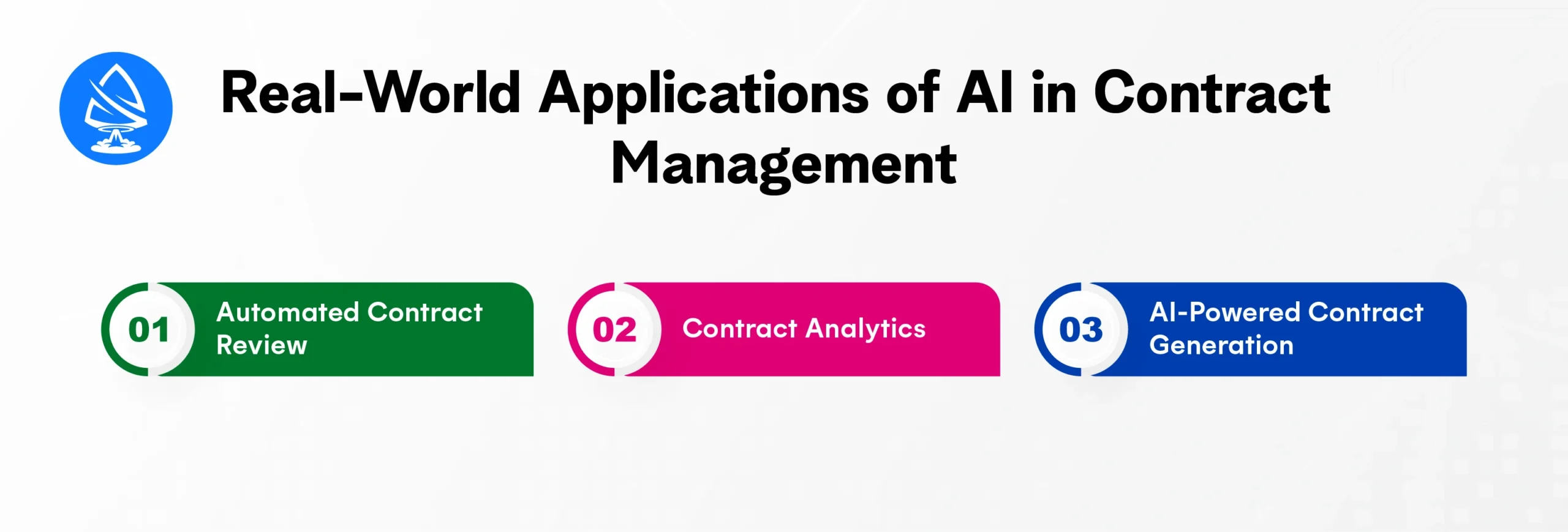
AI contract review software can analyze contracts and flag problematic clauses, such as ambiguous terms or clauses that are not in line with company policy. It speeds up the review process and ensures that contracts are consistent with organizational standards.
AI tools analyze historical contract data to provide insights into trends and behaviors. These insights help businesses optimize future contracts, improve negotiation strategies, and ensure better compliance with terms.
AI can automate the creation of contracts by pulling data from other systems or documents to fill out templates. This ensures consistency and accuracy while speeding up contract creation.
Several AI technologies are crucial for enhancing contract management, including:
NLP is essential for understanding the textual content of contracts. It enables AI to read, interpret, and generate human-like responses based on contract data.
Machine learning helps AI systems learn from historical contract data to predict outcomes, identify risks, and improve decision-making.
RPA automates repetitive tasks, such as contract data entry, approval workflows, and compliance checks, allowing legal teams to focus on more strategic activities.
Artificial Intelligence (AI) has become a transformative force in various business domains, and contract management is no exception. Traditionally, managing contracts involved complex, manual processes that were time-consuming, error-prone, and inefficient. However, with the advent of AI in contract management, businesses can now streamline these processes, reduce costs, and improve overall efficiency.
Here, we’ll explore the key benefits that AI brings to the table when it comes to managing contracts and how businesses can leverage these technologies to improve their operations.
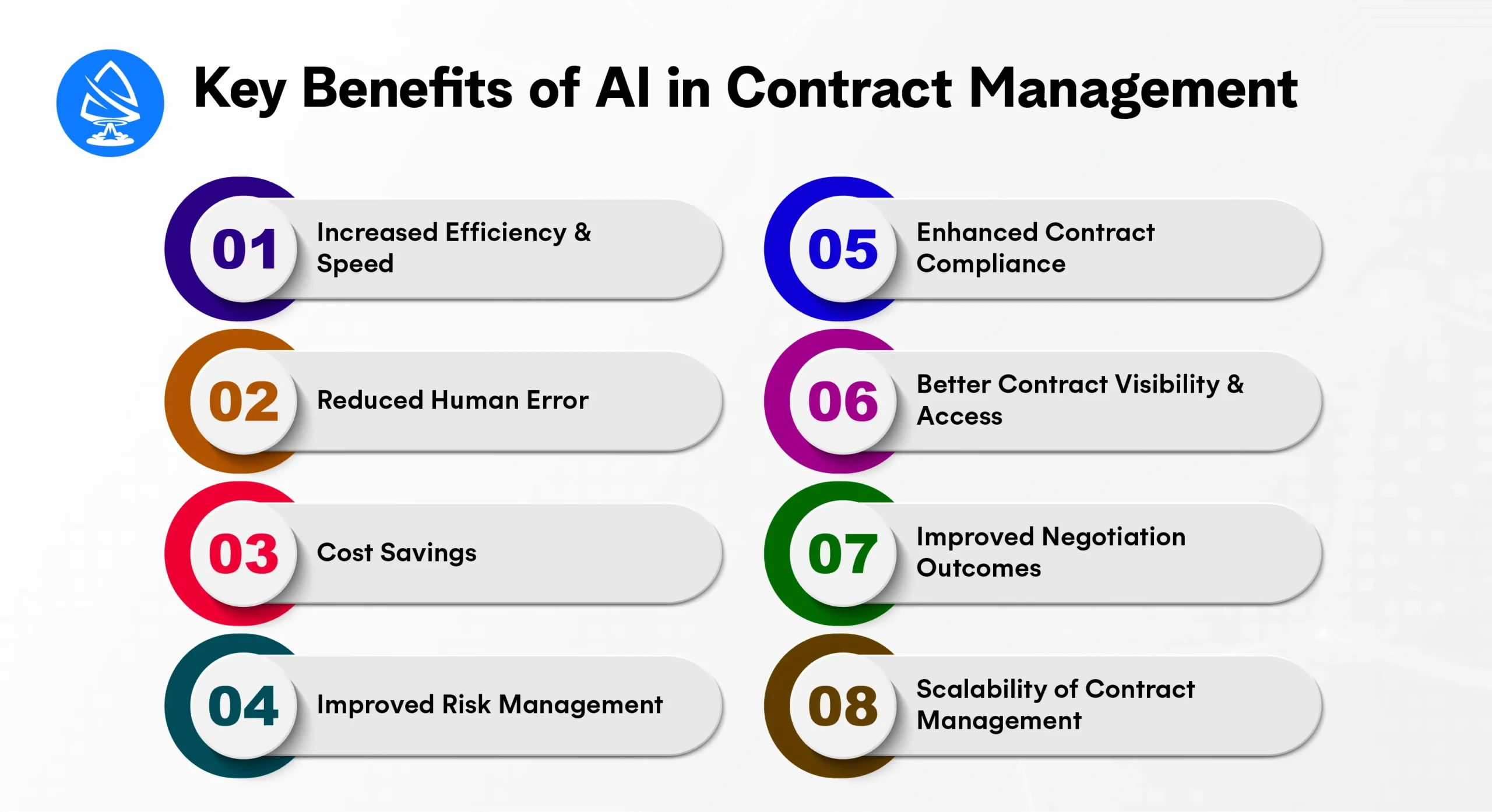
One of the primary benefits of using AI in contract management is the significant improvement in efficiency and speed. Traditionally, legal teams spend a significant amount of time reviewing and drafting contracts manually. With AI, much of this work can be automated, saving businesses valuable time and allowing legal teams to focus on more strategic tasks.
Example: Kira Systems, an AI-powered contract management platform, can extract clauses, compare contracts, and quickly highlight differences, making contract review much faster than manual methods.
Manual contract management processes are highly susceptible to human error. Legal teams can miss important clauses, overlook deadlines, or misinterpret contract terms, leading to costly mistakes. AI can mitigate this risk by automating the review process and ensuring consistency.
Example: Luminance uses machine learning to read and understand contracts, ensuring that every contract is reviewed thoroughly and that no terms are overlooked, reducing the chance of human error.
AI in contract management significantly reduces the costs associated with contract drafting, review, and administration. By automating routine tasks, AI can lower the need for extensive manual labor, enabling businesses to reallocate resources to more strategic activities.
Example: AI contract review software, such as LawGeex, can automate the review process, reducing the need for expensive hourly labor typically required for reviewing lengthy contracts.
AI in contract management helps businesses identify potential risks and mitigate them before they become costly problems. By analyzing contract terms, AI can flag unfavorable clauses, non-compliance issues, and other risks that may not be immediately obvious.
Example: ContractPodAI uses AI-powered contract risk analysis to automatically highlight high-risk terms and suggest more favorable alternatives based on past agreements.
Compliance is a critical factor in contract management, especially as businesses face increasingly complex regulations and legal requirements. AI helps ensure that contracts meet all legal standards and compliance requirements.
Example: Ironclad integrates AI into its platform to automatically track key contract milestones, such as deadlines and compliance requirements, ensuring that businesses never miss important obligations.
AI tools improve contract visibility by organizing and storing contracts in a centralized, easily searchable database. This makes it easier for businesses to find, review, and manage contracts, improving overall contract administration.
Example: DocuSign CLM uses AI to streamline contract management by allowing users to search and retrieve contract data effortlessly, reducing time spent looking for critical information.
AI can support contract negotiations by analyzing historical contract data and offering recommendations based on past outcomes. AI tools help businesses understand the typical negotiation patterns and suggest terms that are more likely to lead to a successful agreement.
Example: Contract Lifecycle Management (CLM) tools that use AI offer insights into contract negotiation trends, helping businesses create stronger contracts and achieve better outcomes.
As businesses grow, the volume of contracts they need to manage also increases. AI-powered systems are highly scalable, meaning businesses can easily manage large volumes of contracts without compromising efficiency or accuracy.
Example: Agiloft provides an AI-powered contract management solution that can handle high volumes of contracts for businesses of all sizes, offering automation that scales as the company grows.
The integration of AI in contract management has transformed how businesses create, manage, and optimize contracts. By utilizing a variety of cutting-edge artificial intelligence technologies, AI tools can automate, analyze, and enhance every aspect of the contract lifecycle from drafting to compliance monitoring. These technologies have significantly streamlined traditional contract management processes, providing businesses with faster, more efficient, and cost-effective solutions.
Below, we’ll dive deeper into the key technologies behind AI in contract management, explaining how each contributes to smarter, more efficient contract management.
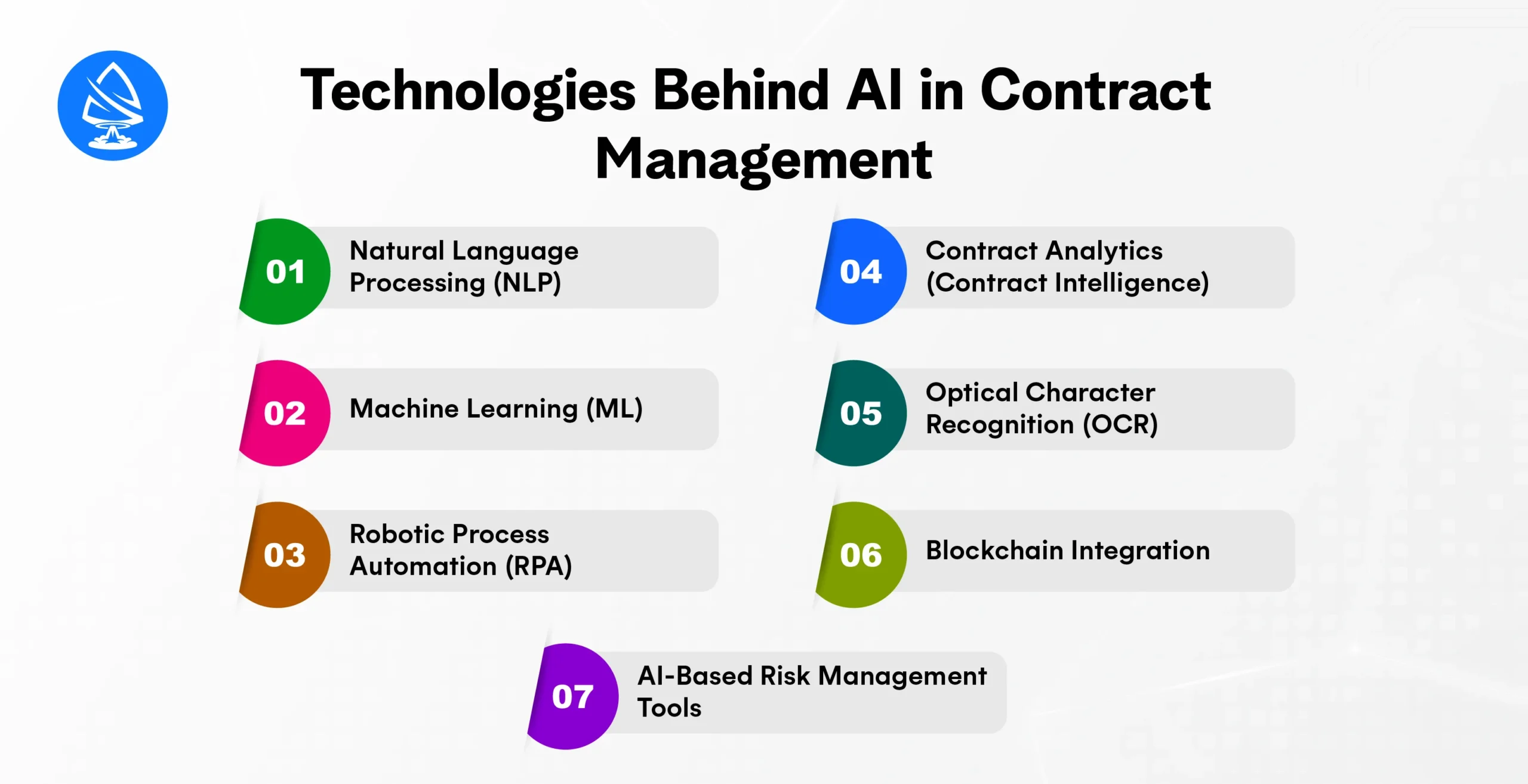
One of the most essential AI technologies used in contract management is Natural Language Processing (NLP). NLP enables machines to understand, interpret, and generate human language. In the context of contracts, NLP allows AI systems to read and process legal language, which is often complex and nuanced.
Kira Systems uses NLP to analyze contracts and automatically extract key clauses and terms, reducing the time required for manual contract review.
Machine learning (ML) is a branch of AI that allows systems to learn from data and improve over time without being explicitly programmed. In contract management, ML algorithms analyze large volumes of contract data to identify patterns, predict outcomes, and offer insights for more informed decision-making.
LawGeex uses machine learning to automate the contract review process by comparing contract terms against predefined standards and flagging discrepancies, improving accuracy and speed.
Robotic Process Automation (RPA) is a technology used to automate repetitive, rule-based tasks. In contract management, RPA can handle manual processes such as data entry, document generation, and routing contracts for approval, all of which are time-consuming when done manually.
UiPath, a leader in RPA, can automate many administrative tasks in contract management, such as tracking contract statuses and updating contract records in a centralized database.
Contract analytics, also known as contract intelligence, involves using AI tools to analyze contracts in real-time, providing valuable insights into the risks, opportunities, and obligations within a contract. This technology uses AI to evaluate contracts at a deeper level, providing more advanced insights that traditional methods can’t offer.
Luminance uses AI-powered contract analytics to enable businesses to spot risks, improve compliance, and uncover trends in their contracts, all while automating contract review.
Optical Character Recognition (OCR) is a technology that converts different types of documents, such as scanned paper documents, PDFs, or images, into editable and searchable data. OCR plays a crucial role in contract management by helping AI systems read and extract data from physical contracts or non-editable digital documents.
Adobe Acrobat Pro integrates OCR to convert scanned contracts into text that AI tools can analyze, enabling businesses to efficiently manage and process contracts that were once locked in non-editable formats.
While not traditionally associated with AI, blockchain technology is increasingly being integrated with AI to ensure the security and transparency of contracts. Blockchain’s decentralized, immutable ledger ensures that contracts are securely recorded and can be tracked without the risk of tampering or fraud.
Ethereum is a blockchain platform that supports smart contracts, where AI can help automate and enforce contract terms, ensuring secure and transparent execution.
AI-powered risk management tools are essential for identifying and mitigating potential risks in contracts. These tools leverage AI to continuously monitor contract clauses, flagging any potential issues before they become critical.
Cortexica offers an AI-powered risk management platform that helps businesses spot potential risks in contracts and take preventive action before issues arise.
Contract management is a critical process for businesses, particularly in industries where legal agreements play a central role in operations. With the rise of artificial intelligence (AI), businesses now have access to powerful tools that can streamline the entire contract lifecycle, from creation and negotiation to compliance monitoring and analysis. AI tools can automate manual tasks, reduce human errors, ensure better compliance, and provide valuable insights, making them indispensable for modern contract management.
Below are some of the top AI tools for contract management, designed to enhance productivity, improve accuracy, and reduce risks.
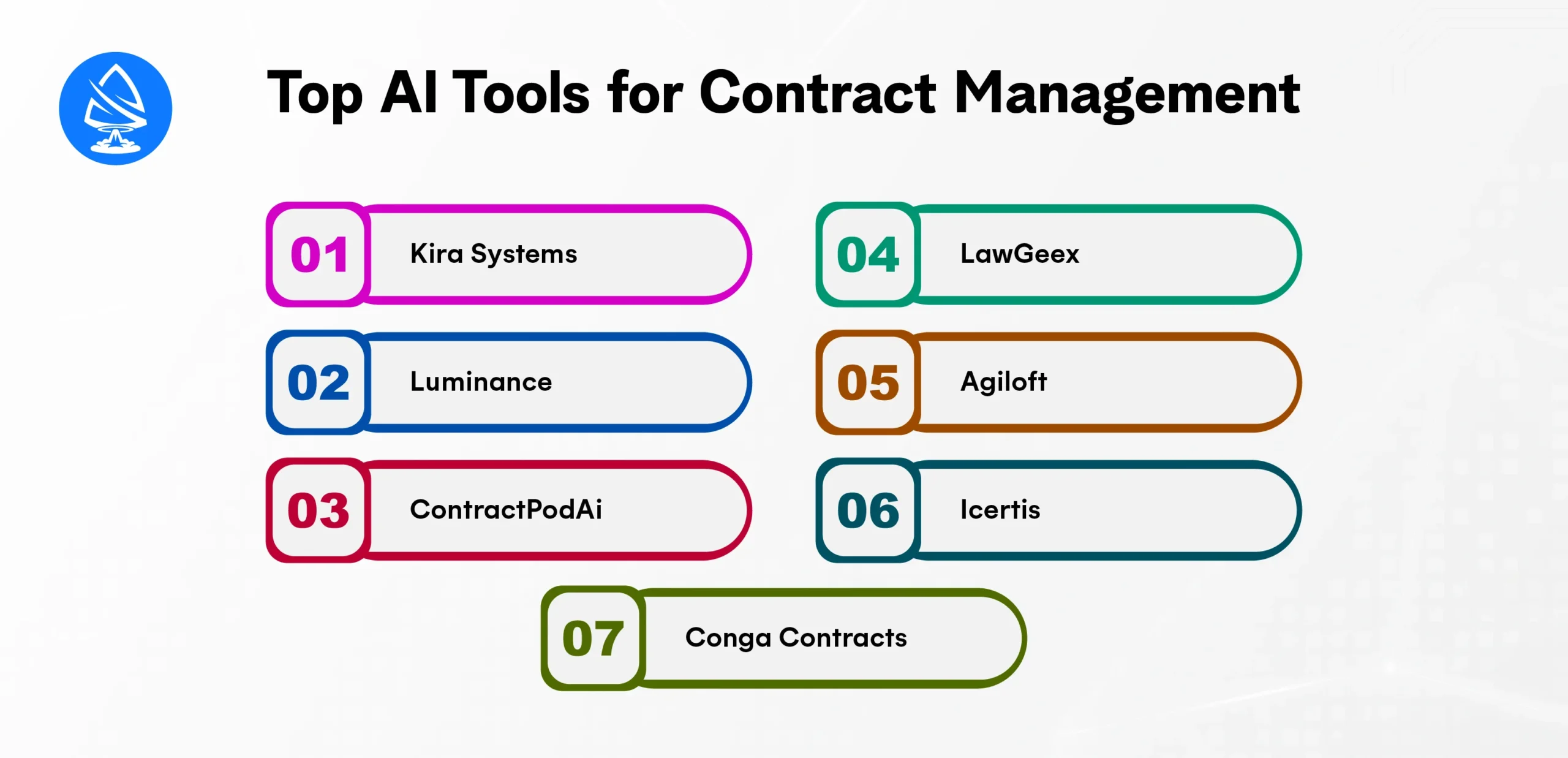
Kira Systems is one of the leading AI contract management tools that uses machine learning (ML) and natural language processing (NLP) to automate the review and analysis of contracts. It is especially useful for businesses in the legal and financial sectors that need to process large volumes of contracts quickly and accurately.
Why It’s a Top Tool: Kira Systems helps businesses save time and reduce the risk of missing critical clauses or details during contract review. It’s particularly useful for contract analysis in mergers and acquisitions, real estate, and regulatory compliance.
Luminance is an AI-powered contract review software that leverages machine learning to analyze contracts and other legal documents in real time. It is designed to help legal teams spot risks, identify trends, and automate the review of contracts, making it an excellent tool for contract management.
Why It’s a Top Tool: Luminance is ideal for businesses handling large volumes of contracts or operating in highly regulated environments. Its ability to quickly analyze and assess contracts for compliance and risk is particularly useful for law firms and large enterprises.
ContractPodAi is a comprehensive contract management solution that uses AI to automate the creation, management, and review of contracts. It integrates NLP and machine learning technologies to simplify the contract lifecycle and increase efficiency across the organization.
Why It’s a Top Tool: ContractPodAi’s user-friendly interface and broad feature set make it a powerful tool for businesses seeking a comprehensive solution for contract management. Its focus on automation and efficiency makes it an excellent choice for companies looking to streamline their contract operations.
LawGeex is an AI-powered contract review software that specializes in automating the process of reviewing legal documents. It uses machine learning to compare contract terms against predefined legal standards and flag any discrepancies, saving businesses significant time and effort during contract negotiations.
Why It’s a Top Tool: LawGeex is especially valuable for businesses that need to ensure strict compliance and minimize legal risks. Its ability to review contracts in real-time and provide actionable insights makes it a top choice for enterprises handling high volumes of contracts.
Agiloft offers a robust AI contract management solution designed to help businesses automate contract workflows and improve contract compliance. With its customizable templates and AI-powered tools, Agiloft is widely used across industries such as manufacturing, healthcare, and government.
Why It’s a Top Tool: Agiloft’s flexibility and scalability make it a great choice for businesses of all sizes. Its ability to integrate AI with contract lifecycle management provides greater control and visibility over contracts, enhancing compliance and reducing operational risks.
Icertis is a leader in contract lifecycle management (CLM) that leverages AI to streamline contract management processes and improve contract visibility. It uses advanced AI technologies to analyze contract terms, track key obligations, and mitigate risks.
Why It’s a Top Tool: Icertis is known for its scalability and flexibility, making it an excellent choice for large enterprises that need a comprehensive contract management solution with robust AI capabilities.
Conga Contracts offers a suite of AI-powered tools to help businesses manage contracts from initiation to execution. The platform focuses on automating contract creation, improving collaboration, and ensuring compliance, making it easier to handle the complexities of contract management.
Why It’s a Top Tool: Conga Contracts excels in contract collaboration and automation, making it ideal for businesses that need a unified platform to manage their contracts efficiently. Its AI-driven features help organizations optimize contract terms and improve overall compliance.
The advent of artificial intelligence (AI) has drastically altered many aspects of business operations, and one area where its impact is particularly profound is contract management. Traditional contract management processes are often complex, time-consuming, and prone to human error. However, AI technologies, particularly machine learning (ML), natural language processing (NLP), and automation tools, are revolutionizing how businesses create, review, negotiate, and monitor contracts.
AI is not just enhancing individual tasks within contract management but is fundamentally changing the way organizations approach contracts, leading to greater efficiency, reduced costs, improved compliance, and more informed decision-making. Let’s take a deeper look at how AI in contract management is reshaping business operations across various industries.
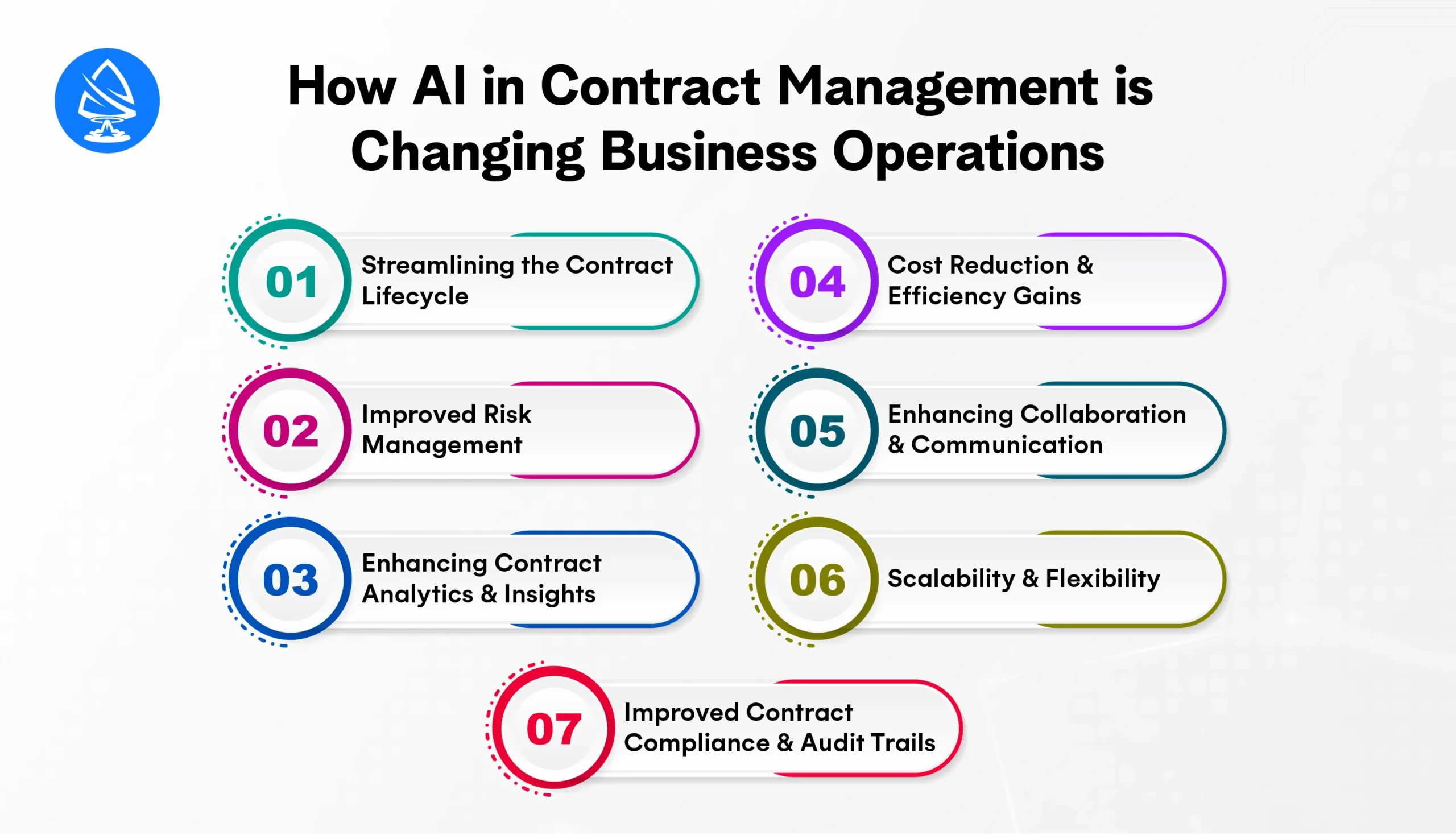
One of the most significant changes that AI has brought to contract management is the streamlining of the entire contract lifecycle, from creation to execution. Traditionally, contract management has involved various manual steps, including drafting, reviewing, negotiating, approving, and monitoring contracts. These steps are time-consuming and prone to delays due to human error, communication gaps, and document mismanagement.
Example: AI contract management platforms like ContractPodAi or DocuSign CLM allow businesses to automate many stages of the contract lifecycle, freeing up legal and operational teams to focus on more value-added tasks.
AI enhances risk management in contract management by analyzing contract data and identifying potential risks before they become serious issues. In traditional contract management, identifying risks often required manually reviewing each clause, which could be time-consuming and incomplete. AI changes this by quickly identifying potential risks or compliance issues across a large number of contracts, providing real-time alerts and recommendations for action.
Example: AI-powered tools like Kira Systems can automatically detect risky or non-standard clauses in contracts, reducing the likelihood of expensive legal disputes or compliance issues.
AI is bringing an unprecedented level of contract analytics to businesses. Traditional contract management systems stored contracts in repositories but lacked the tools to analyze and extract meaningful insights from them. AI, however, can analyze contracts at scale, extracting key data and generating insights that inform better business decisions.
Example: Luminance uses AI to analyze contract data and provides actionable insights about the performance of contracts, helping businesses make informed decisions about contract renewals or negotiations.
One of the most direct impacts AI has on contract management is the reduction of costs and the improvement of operational efficiency. By automating routine tasks and reducing manual intervention, businesses can reduce operational overhead and improve the speed and quality of their contract-related processes.
Example: LawGeex, an AI-powered contract review software, helps legal teams cut down on the time spent reviewing contracts, allowing companies to complete contract negotiations faster, thus reducing administrative overhead.
AI in contract management not only automates processes but also enhances collaboration and communication across teams. Contracts typically require input from multiple stakeholders, including legal, procurement, finance, and executive teams. AI can streamline this collaborative process, making it more transparent and efficient.
Example: Agiloft offers an AI-powered platform that centralizes contract data, streamlines approval workflows, and improves communication across teams involved in contract management.
As businesses grow, so does the volume of contracts they manage. Traditional contract management processes often struggle to keep up with increasing volumes, leading to inefficiencies. AI-powered contract management tools offer businesses the scalability and flexibility needed to handle growing contract volumes without compromising efficiency or accuracy.
Example: Icertis offers an AI-powered contract lifecycle management system that is highly scalable and flexible, enabling businesses to manage large portfolios of contracts while ensuring compliance and reducing risk.
Maintaining compliance with contracts is a crucial part of managing legal agreements. Non-compliance can lead to legal disputes, penalties, or business risks. AI tools help businesses monitor and ensure compliance with contract terms and obligations, reducing the likelihood of breaches.
Example: Ironclad provides AI-driven contract management that automates compliance monitoring, ensuring that businesses meet all legal requirements and internal policies.
The integration of AI in contract management is revolutionizing how businesses handle contracts. With AI-powered tools and software, companies can automate tasks, reduce errors, mitigate risks, and improve compliance across their contract management processes. The use of artificial intelligence in contract analysis and contract review enables businesses to operate more efficiently, save costs, and gain valuable insights that were once difficult to access. Partnering with an AI development company in USA can help you implement customized AI solutions to optimize your contract management workflows.
By adopting AI contract management software, businesses can streamline their operations, enhance productivity, and ensure better compliance with evolving regulations. As AI continues to evolve, the future of contract management is increasingly being defined by smart, automated, and data-driven technologies.
AI in contract management refers to using artificial intelligence technologies like machine learning and natural language processing to automate and improve contract lifecycle management, including contract review, creation, and compliance tracking.
AI speeds up contract review by automating the extraction of key clauses, flagging potential risks, and ensuring compliance with relevant standards, significantly reducing the time required for manual review.
The main benefits include improved efficiency, cost reduction, enhanced accuracy, risk mitigation, and better compliance tracking.
Yes, AI contract management tools can automate contract creation by generating contract drafts based on predefined templates and historical data, ensuring consistency and accuracy.
Contract intelligence refers to the use of AI to understand, analyze, and optimize contract data, helping businesses improve contract terms, detect risks, and gain insights from contract language.
AI uses machine learning and NLP to analyze contract text and identify clauses that could lead to legal or financial risks, such as ambiguous terms or non-compliance issues.
AI-powered contract management systems automate and optimize tasks like contract review, data extraction, compliance tracking, and risk analysis, improving the overall contract lifecycle.
Businesses can implement AI in contract management by partnering with an AI development company, selecting appropriate AI tools, and integrating them into existing contract management systems for automation and optimization.